2016届中考英语复习学案:八年级英语上册Unit1-2
八年级英语上册Unit1-2 复习导学案

班级小组姓名学号使用时间八年级英语导学案编写人备课组长编写时间12.15 学科主任编号 1课题Unit 1---2 课型预习展示学习目标1.会说会写会运用Unit 1---2单词及短语2.会运用关于频度的句型A:How often does she watch TV ? B:She watches TV once a week.3.谈论问题及会提建议A: What’s the matter? B: He has a toothache. A: He should see a dentist.学习过程Step1:自主学习任务一:会说会写会运用下列短语1.多久一次___2.一周一次_________3..尽力做某事____4.照顾_________5.至于,关于________6.对...有好处______7.保持健康_____________8.感冒_______ 9. 后背痛_____________________10.躺下来休息__________11.看牙医______12.加蜂蜜的热茶________ 13.三天前______ 14. 大部分学生_______________15.与…不同____________________任务二:关于频度副词的应用1.翻译下列频度副词always ________usually________ often________ sometimes________ hardly ever ___________ never ________twice a week ________once a month________ every day ____________2.提问频度副词时可以用疑问词____________,如He__________(几乎不) exercises .提问:______ _______ ______he ________ ?3.翻译:他多久锻炼一次?他一周锻炼两次。
八年级英语上册Units1--2学案
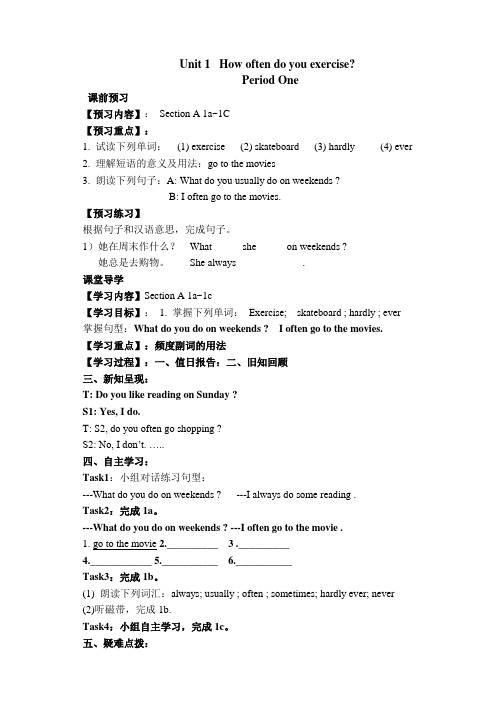
Unit 1 How often do you exercise?Period One课前预习【预习内容】:Section A 1a~1C【预习重点】:1. 试读下列单词:(1) exercise (2) skateboard (3) hardly (4) ever2. 理解短语的意义及用法:go to the movies3. 朗读下列句子:A: What do you usually do on weekends ?B: I often go to the movies.【预习练习】根据句子和汉语意思,完成句子。
1)她在周末作什么?What _____ she _____ on weekends ?她总是去购物。
She always ______ ______.课堂导学【学习内容】Section A 1a~1c【学习目标】:1. 掌握下列单词:Exercise; skateboard ; hardly ; ever掌握句型:What do you do on weekends ? I often go to the movies.【学习重点】:频度副词的用法【学习过程】:一、值日报告:二、旧知回顾三、新知呈现:T: Do you like reading on Sunday ?S1: Yes, I do.T: S2, do you often go shopping ?S2: No, I don’t. …..四、自主学习:Task1:小组对话练习句型:---What do you do on weekends ? ---I always do some reading .Task2:完成1a。
---What do you do on weekends ? ---I often go to the movie .1. go to the movie2.__________ 3 .__________4.____________5.___________6.___________Task3:完成1b。
初三英语复习八年级(上)Units1-2导学案
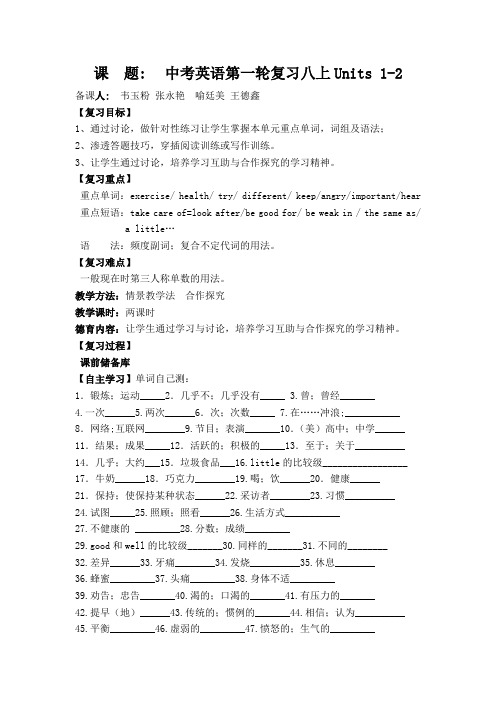
课题:中考英语第一轮复习八上Units 1-2备课人:韦玉粉张永艳喻廷美王德鑫【复习目标】1、通过讨论,做针对性练习让学生掌握本单元重点单词,词组及语法;2、渗透答题技巧,穿插阅读训练或写作训练。
3、让学生通过讨论,培养学习互助与合作探究的学习精神。
【复习重点】重点单词:exercise/ health/ try/ different/ keep/angry/important/hear 重点短语:take care of=look after/be good for/ be weak in / the same as/ a little…语法:频度副词;复合不定代词的用法。
【复习难点】一般现在时第三人称单数的用法。
教学方法:情景教学法合作探究教学课时:两课时德育内容:让学生通过学习与讨论,培养学习互助与合作探究的学习精神。
【复习过程】课前储备库【自主学习】单词自己测:1.锻炼;运动_____2.几乎不;几乎没有_____ 3.曾;曾经_______4.一次______5.两次______6.次;次数_____ 7.在……冲浪;___________ 8.网络;互联网________9.节目;表演_______10.(美)高中;中学______ 11.结果;成果_____12.活跃的;积极的_____13.至于;关于__________ 14.几乎;大约___15.垃圾食品___16.little的比较级_________________ 17.牛奶______18.巧克力________19.喝;饮______20.健康______21.保持;使保持某种状态______22.采访者________23.习惯__________24.试图_____25.照顾;照看______26.生活方式___________27.不健康的 _________28.分数;成绩_________29.good和well的比较级_______30.同样的_______31.不同的________32.差异______33.牙痛________34.发烧__________35.休息________36.蜂蜜_________37.头痛_________38.身体不适_________39.劝告;忠告_______40.渴的;口渴的_______41.有压力的_______42.提早(地)______43.传统的;惯例的_______44.相信;认为__________ 45.平衡_________46.虚弱的_________47.愤怒的;生气的_________48.药;药物_______49.西方的_______50.重要的;重大的_________【复习展示】短语大声背:1.take care of=look after2. a little/a few3.be good for4.take an active part in5.be weak in6. be stressed out7.have a cold/have a fever /have a stomachache;have a headache =have a pain in one’s head have a toothache/have a sore back8. be angry with9. feel well10.eat a balanced diet 11. the same as 12. twice a month13. take exercise/ do eye exercises 14. keep healthy=keep in good health 15. hardly ever 16. lie down 17. get tired 18. It’s easy to do …牢记重点句:1.What does he do on weekends? He often surfs the Internet.2.How often do you exercise? I exercise twice a week.3.How many hours do you sleep every night? I sleep nine hours every night.4.Drinking milk is good for my health.5.My mother wants me to keep healthy.My healthy lifestyle helps me to keep in good health.I look after my health. I try to eat healthily.6.Is her lifestyle the same as yours?【教学过程】教学过程(进程及内容):(一)内容设计:Step one :【互动合作】体验重点词:exercise:1.He exercises once a week. = He ____ ______once a week.= He ____ ____ once a week.= He ____ _____ once a week.2. Doing eye exercises is good for us.= ____ is good for us ___ ___ eye ________.health : 1. ______ lifestyle is good for ______.(health)2. The more vegetables you eat, the ____you will be.(health)try : 1. He tries ______(eat) more fruit in order to keep fit.2.The teacher said we should try _____(not be) late for the meeting.3.Do you mind my ______(试穿) your coat?different: 1. His habit ________(和,不同) his brother’s.2. There are some ______(不同) between the twins.keep: 1.He likes keeping ______(busy).2.Jim keeps ______(practice) English every day.3..After a short rest, he kept on _____(run).angry: 1. Jim ________(生气) his friend last term.= Jim ____ ____ ____ his friend last term.= Jim ____ ____ _____ his friend last term.运用促提高:(小提示:注意用适当形式啊)1.He often _______(锻炼) on weekends.2.He goes to Beijing_______(两次).3.He likes surfing on the _____(互联网).4.The __________(结果) are surprising.5.You should take an ____(积极的) part in the discussion.6.______(至于) homework, I think I can finish it on time.7.Drinking too much ________(咖啡) is bad for our ____________(健康)8..Because of his______(疾病), he didn’t come to school. He was ___(生病的).9.He _________(试图) to help me when I was in trouble.10.His lifestyle is ____(不同的) from mine. There are some ______(不同).Step Two: 短语集中练1._____________(做眼保健操) every day is necessary for us.2.He __________(几乎不曾锻炼) on weekends.3.Patients ____________(照顾) well by the nurses in this hospital.4.In order to _______(保持健康), we need to exercise more.5.He ____________(积极参加) the sports meeting when he was a student.6.Jim’s dictionary is ______________(和我的一样).7.Taking notes is ________(有益于) our study.8.Jim says he ___________(差的) Chinese.9.Loud music often makes me __________(紧张的).10.It is easy for us ______________(吃均衡饮食).Step Three: 语法练兵场一般现在时:表示:_________________ 标志词:__________________ 结构:They do sports every day. They don’t do sports every day.Do they do sports every day? How often do they do sports?语法大练兵:1. My father watches TV three times a week at home.(提问)_____ ______ ____ your father ____ TV at home?2. My brother often does his homework after supper.(否定句)My brother ____ often ____ his homework after super.Step Four :【巩固提高】中考题型练一,根据句意及所给提示,用单词、固定短语、固定搭配的正确形式填空。
新目标英语八年级上unit1-2复习学案

新目标英语八年级上unit1-2复习学案uni.1--2一、词组1.ho.ofte.多久一.2.a.fo.sth/doin.st.至于,关.3.o.course=c.rtainly=sur.当.4.loo.after=tak.car.of=car.for照.5.hardl.eve.很.6.sur.th.interne.网上冲.7.th.result.o.th.studen.activit.surve.学生活动调查结.8.b.goo.fo.m.healt.对我的安康有.9.he.eatin.habit.她的饮食习.10.wan.u.t.ea.jun.fo..想让我吃垃圾食.11.exercis.twic..wee.一周熬炼两.12.g.skateboardin.去滑.hom.fro.schoo.放学回.14.tr...ea..lo.o.vegetable.尽量多吃蔬.15.health.lifestyl.安康的生活方.16.kee.i.goo.health=kee.healthy=b.i.goo.healt.保持身体安.17.improv.you.englis.提高你的英语水.18.s.o.thre.o.fou.time..mont.一个月购物三次或者四次19.hav..col.感.20.hav..stomachach.胃.21.hav..toothach.牙.22.hav..feve.发.23.hav..sor.throa.喉咙.24.hav..sor.bac.背疼25.li.dow.an.res.躺下休.26.se..dentis.看牙.27.ho.te.wit.hone.带蜂蜜的热.28.b.stesse.ou.有压力的,惊慌.29.a.th.momen.此时,此时此.30.not…unti.直到…….31.hos.famil.寄宿家.9.hav..health.lifestyl.有安康的生活方.32.ea..balance.die.膳食平.33.stay.kee.health.保持安康34.tradi.iona.chines.doctor传统中医35.nee.som.conversatio.pr.ctic.须要一些对话练.二、句子1.ho.ofte.d.yo.g.t.th.movies.你多久看一次电影?2.wha.doe.sh.d.o.weekends.她周末做什么?.她经常看电视.3..om.student.ar.ver.activ.a..exercis.ever.day.一些学生很活泼每天熬炼。
中考英语考前总复习学案之八年级上册1-2单元
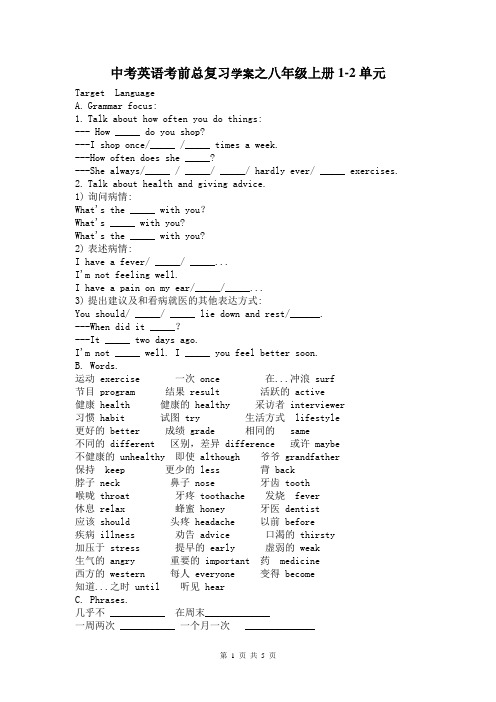
中考英语考前总复习学案之八年级上册1-2单元Target LanguageA.Grammar focus:1.Talk about how often you do things:--- How _____ do you shop?---I shop once/_____ /_____ times a week.---How often does she _____?---She always/_____ / _____/ _____/ hardly ever/ _____ exercises.2.Talk about health and giving advice.1)询问病情:What's the _____ with you?What's _____ with you?What's the _____ with you?2)表述病情:I have a fever/ _____/ _____...I'm not feeling well.I have a pain on my ear/_____/_____...3)提出建议及和看病就医的其他表达方式:You should/ _____/ _____ lie down and rest/______.---When did it _____?---It _____ two days ago.I'm not _____ well. I _____ you feel better soon.B. Words.运动 exercise 一次 once 在...冲浪 surf节目 program 结果 result 活跃的 active健康 health 健康的 healthy 采访者 interviewer习惯 habit 试图 try 生活方式lifestyle更好的 better 成绩 grade 相同的same不同的 different 区别,差异 difference 或许 maybe不健康的 unhealthy 即使 although 爷爷 grandfather保持 keep 更少的 less 背 back脖子 neck 鼻子 nose 牙齿 tooth喉咙 throat 牙疼 toothache 发烧 fever休息 relax 蜂蜜 honey 牙医 dentist应该 should 头疼 headache 以前 before疾病 illness 劝告 advice 口渴的 thirsty加压于 stress 提早的 early 虚弱的 weak生气的 angry 重要的 important 药 medicine西方的 western 每人 everyone 变得 become知道...之时 until 听见 hearC. Phrases.几乎不 ___________ 在周末_____________一周两次 ___________ 一个月一次 ______________学生活动的调查______________ 积极的______________至于_____________ 大多数学生______________保持健康_____________ 饮食习惯______________尽量吃许多蔬菜 ___________ 喝杯饮料______________留意我的健康_____________ 健康的生活方式 _________与...一样_____________ 与...不同______________喉咙痛 _____________ 躺下休息 ______________牙齿疼____________ 胃疼_____________发烧_____________ 喝杯加蜂蜜的热茶__________感冒_____________ 两天前_____________紧张_____________ 早点起床 _____________晚饭前踢足球____________ 例如______________健康的生活方式_____________ 对...有好处_____________中药_____________ 在许多西方国家___________有平衡的饮食 ______________ 疲惫 _____________几个晚上 _______________ 现在/此刻______________D. Sentences.1.我妈妈想让我喝牛奶,她说对健康有益。
中考英语一轮复习 八上U1-2复习 课程教学设计.doc

八上U1-2复习教学设计—、教材分析本部分内容来自人教版八年级上册,是对Unitl和Unit2基础知识的进一步巩固与加深。
其话题是用过去时了解学生们的假期活动以及频率问题,与学生们的生活紧密结合,能够极大地激发学生们学生的兴趣。
该教材从学生的已有知识水平与心理特征出发,以《新课程标准》为依据, 复习过程由浅入深,循序渐进,具体设计如下:1.对基础单词的复习,掌握重点单词以及短语,为接下来知识点的复习奠定知识基础。
2.以课本编排为线索,按页码顺序进行基础知识的复习,讲解过程中进一步拓展知识,与中考考点链接。
3.以《升学锦囊》为依据,对高频考点进一步讲解,辨析难点、混淆点,并以图表、例题来进一步巩固练习。
4.最后一个环节为检测部分。
首先测试《升学锦囊》中的基础知识,在练习中进一步巩固基础知识,夯实基础;进而对阅读进行练习,本节课选取了学生们的弱项一六选五,加强练习,进一步提高学生们的阅读能力。
二' 学情分析(一)在知识储备上:九年级的学生在中考复习中已经具备了一定的知识基础,如何将八年级的知识与中考成绩相连接,更好的做好基础知识储备,从而为阅读理解和表达奠定基础是复习的目的所在。
此外,更好的掌握做题方法, 学会分析问题、理解问题进而解决问题是复习的重要环节。
(二)在情感教育上:面临中考的学生,难免有些紧张和迷茫,因此运用第一单元“假期的回顾”,正好进行假期生活与学习生活的过度,同时,第二单元“频率”这一话题有助于学生养成良好的学习习惯,在授课过程,可进一步进行心理疏导,更好的进行心理教育。
因此在课堂设计上,要坚持以学生为中心,引导学生做好复习。
三' 教学目标(一)知识目标1.能熟读并正确使用下列词汇:anyone, everyone, decide, enjoyable.2.能熟读并正确使用下列日常用语:decide to do sth, at least, try doing, taste good, etc.3.掌握常用句型:Where did you go on vacation?How often do you exercise?(二)能力目标通过复习基础知识,夯实基础,为阅读奠定知识基础。
【英语教案】八年级英语上册《Units1-2》复习教案人教新目标版
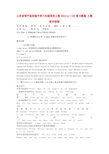
山东省邹平县实验中学八年级英语上册《Units 1-2》复习教案人教新目标版本学期第课时本单元第课时上课日期:________主备人:复备人:审核人:____________学习目标:1 掌握这两个单元中的词汇和短语;2. 背诵短文3a和 Grammar的重点短语和句子教学过程一、出示复习目标:1 how often 引导的问句及被提问的短语(频度的词)2What’s the matter?的回答、同义句及关于生病的相关短语3.I hope…4.I’m sorry to ..读记单词和短语(5分钟)然后听写1.h ow often2.exercise3.hardly4.result5.active6.as for7.drink8.health/healthy /unhealthy9.habit 10.of course 11.look after 12.grade 13.different/di fference 14.maybe/may be 15.although 16. k eep17. little/less/ least 18.have a cold19.headache 20.advice 21.thirsty 22.be stress out 23.traditional 24.believe 25.weak/strong 26.medicine 27.western/eastern 28.a few 29.important/ importance30.balanced 31.at the moment 32.until二、复习Units 1---2课本内容,(10分钟)重点背诵下列短语和句子:重点句子:在周末你通常干什么?What do you usually do on weekends?谢谢你来参加采访。
Thanks for coming in the interview.你多久吃一次蔬菜和水果?。
中考英语八年级上册Unite1—2复习教案

中考英语八年级上册Unite1—2复习教案一、目标:1. 识记频度副词2. 识记与度假相关的动词词组3. 理解表频率的表达法4. 运用频度副词来描写日常发生的动作5. 运用一般过去时态描写过去的旅游事件二、重点:1. 运用一般过去时态描写过去的旅游事件2. 运用频度副词来描写日常发生的动作三、知识梳理:(一)句型与词汇:1. --Where did you go on vacation?--I went to the mountains. 可替换的词有:went to thebeach2.--How was the food?--Everything tasted really good!3.--Did everyone have a good time?--Oh, yes. Everything was excellent.have a good time“玩得开心”可以用have fun, enjoy oneself, have a great time替代。
have fun doing sth.“做某事有乐趣”1I had great fun playing cards with them.我和他们玩纸牌玩得非常高兴.4. --How often do you go to the movies?--I go to the movies maybe once a month.How long--I always exercise./ help with housework...6. --How did you feel about the trip?--Wonderful.询问对人或事物的看法和评价。
类似询问看法的句型还有:How did you like the trip?/ What did you think of / about the trip?/ How was the trip?(二)语法:1. We waited over an hour for the train because there were too many people.2He has too much trouble inhis life.2. And because of the bad weather, we couldn’t see anything below.The food tasted great because I was so hungry.because是连词, because+句子because of是介词短语because of+V-ing/n.例:He didn't go to school because he was ill.=He didn't go to school because of his illness他因为生病没去上学。
新目标英语八年级上unit1-2复习学案(精选3篇)
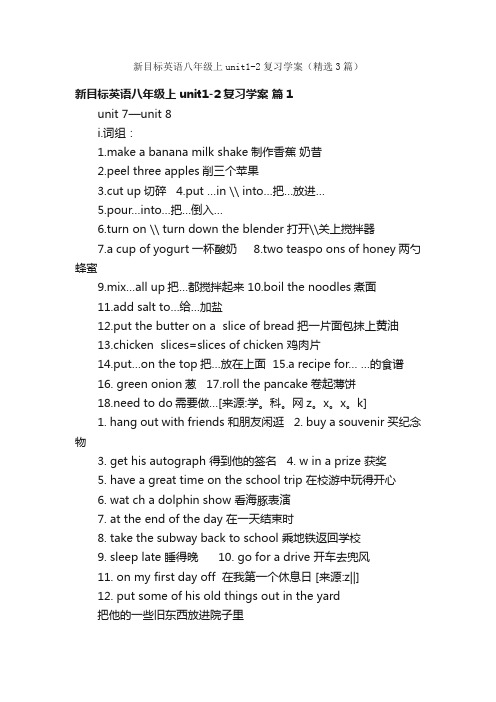
新目标英语八年级上unit1-2复习学案(精选3篇)新目标英语八年级上unit1-2复习学案篇1unit 7—unit 8i.词组:1.make a banana milk shake制作香蕉奶昔2.peel three apples削三个苹果3.cut up切碎4.put …in \\ into…把…放进…5.pour…into…把…倒入…6.turn on \\ turn down the blender打开\\关上搅拌器7.a cup of yogurt一杯酸奶 8.two teaspo ons of honey两勺蜂蜜9.mix…all up把…都搅拌起来 10.boil the noodles煮面11.add salt to…给…加盐12.put the butter on a slice of bread把一片面包抹上黄油13.chicken slices=slices of chicken 鸡肉片14.put…on the top把…放在上面15.a recipe for… …的食谱16. green onion葱 17.roll the pancake卷起薄饼18.need to do需要做…[来源:学。
科。
网z。
x。
x。
k]1. hang out with friends 和朋友闲逛2. buy a souvenir 买纪念物3. get his autograph 得到他的签名4. w in a prize 获奖5. have a great time on the school trip 在校游中玩得开心6. wat ch a dolphin show 看海豚表演7. at the end of the day 在一天结束时8. take the subway back to school 乘地铁返回学校9. sleep late 睡得晚 10. go for a drive 开车去兜风11. on my first day off 在我第一个休息日 [来源:z||]12. put some of his old things out in the yard把他的一些旧东西放进院子里13. in my opinion 依我的观点14. win first prize in yesterday’s singing competition在昨天的唱歌比赛中获得第一名15. have a yard sale 庭院出售* notice1 turn on / off / down / upit’s one’s turn to do sth2 cut down / cut up3 疑问词 how many / how muchii.句子:1.how do you make fruit salad? 你怎样制作水果沙拉?2.i need three o ranges . 我需要三个橘子。
2016中考人教版八年级上册英语Units1-2复习课件
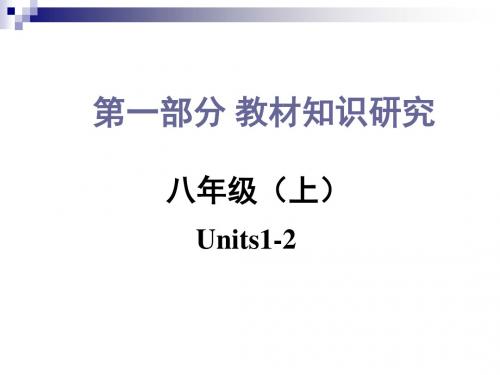
decide (not) to do sth. „„决定(不) 做某事”
decide on/upon (doing) sth.“决定 (做)某事” decide的用法 decide+宾语从句 decide+疑问句+to do 名词为decision, make a decision做 决定
如:He decided to go home at once. 他决定立即
第一部分 教材知识研究
八年级(上)
Units1-2
练讲重难点 考点一 辨析a few, few, little与a点四 考点五
decide的用法
try的用法 wonder的用法 辨析because of与because
考点六
考点七
enough的用法
频度副词的用法
考点八
We took quite a few photos there.我们在那里照
了许多照片。(Unit 1 P2)
考点二
decide的用法
It was sunny and hot, so we decided to go to the
beach near our school.天气晴朗而且热,所以我们决
定去我们学校附近的海滩。(Unit 1 P5) 【考点抢测】 1. The children decided ______ their school yard yesterday. A. to clean B. cleaned C. cleaning D. clean
【满分点拨】 decide作动词,意为“决定”。其常见的用法有:
【满分点拨】 二者均表示“因为”的含义,但具体的用法不同。 具体如下:
词(组) 词性 后接内容 例句
中考复习学案---新目标英语八年级上册Units 1-2

A.hardly B.always C.sometimes ually
( )3.--will you come back? –In an hour.
A.How often B.How soon C.How far D.How long
Important sentences:
1.你通常在周末做什么?我通常踢足球。
2.你妈妈多久购物一次?一个月两次
3.她说那对我的健康有好处。
4.你每天晚上睡多少小时?
5.我的健康的生活方式帮助我取得好成绩
6.你怎么啦?===
7.我牙痛或许你应该看医生
8.我感觉不好。
9.我希望你尽快好转。
10.吃党参和黄芪这些草药也对这有好处
9.Jimmy is good at(sing) popular songs.
10.She sees a film(one) a week.
二.单项选择。()1.I was so tired that I couldwalk any farther.A.nearly B.hardly
( )2.—I saw you come to school by bus this morning.
Writing:
How to keep healthy
共1页
11.拥有健康的生活方式是容易的,平衡的饮食是重要的
Exercise:一.用所给单词的适当形式填空.
1.The babies want(drink) juice.
2.Sheoften(not do)her homework at home.
3.I want to give you some(vegetable).
河北中考英语一轮复习学案:人教版八年级上学期 Units 1—2

八年级(上)Units 1—2中考基础知识梳理词汇拓展(针对“词语运用”题型设置)短语归纳(针对“单项选择”“完形填空”题型设置)句型温故(针对“连词成句”“任务型阅读”题型设置)句型自测:1—5题连词成句;6题英译汉。
1.ever, he, on, goes, weekends, hardly, shoppingHe hardly ever goes shopping on weekends.2.any, are, in, there, mistakes, homework, hisAre there any mistakes in his homework ?3.to, a, car, they, buy, decided, newThey decided to buy a new car .4.health, doing, is, good, sports, for, ourDoing sports is good for our health.5.tomorrow, will, if, I, wonder, he, comeI wonder if he will come tomorrow.6.The answers to our questions about watching television were also interesting.对我们提出的有关看电视的问题的回答也颇有意思。
语法总览1.复合不定代词(详见第二编P93)2.动词过去式的规则变化与不规则变化3.how often引导的特殊疑问句4.频度副词话题再现1.Holidays and vacations(假期)2.Free time activities(闲暇活动)河北五年中考真题演练◆词汇类1.(2020河北中考79题)They were so delicious that I ate more(many) than twenty.(D)2.(2019河北中考35题)Ken was________ late for school.The bell rang right after he entered the classroom.A.still B.always C.already D.almost3.(2019河北中考74题)We had a wonderful(wonder) time.◆句型类4.(2019河北中考84题)teacher's, she, the, advice, tookShe took the teacher's advice.5.(2016河北中考82题)it, I, yesterday, drawI drew it yesterday.河北中考重难点突破decide v.决定;选定(教材八上P5)单项选择。
- 1、下载文档前请自行甄别文档内容的完整性,平台不提供额外的编辑、内容补充、找答案等附加服务。
- 2、"仅部分预览"的文档,不可在线预览部分如存在完整性等问题,可反馈申请退款(可完整预览的文档不适用该条件!)。
- 3、如文档侵犯您的权益,请联系客服反馈,我们会尽快为您处理(人工客服工作时间:9:00-18:30)。
一、词汇拓展1. honest adj. →________(反义词) 7. Britain n.→________ (adj.)2. humour n. →________(adj.) 8. mix v. →________ (adj.)3. high adj.→________(n.) 9. America n. →________ (adj.)4. smile n. →________(adj.) 10. week n. →________ (adj.)5. swim v. →________(n.) 游泳者11. discuss v. →________ (n.)6. happy adj. →______________(反义词) 12. day n. →________ (adj.)13. bad/badly →________(比较级) →________(最高级)14. far adv. →________/________(比较级) →________/________(最高级)二、短语归纳1. 使某人高兴______________________2. 保守秘密_______________________________3. 愿意做某事______________________4. 周游世界_______________________________5. 参加;参与_____________________6. 说谎___________________________________7. 感到无聊________________________8. 给某人讲滑稽的笑话_____________________9. 写下____________________________ 10. 很有幽默感____________________________ 11. 分享某人的快乐_________________ 12. 面带笑容______________________________ 13. 像_____________________________ 14. 在……快要结束的时候__________________ 15. 与某人讨论某事_________________ 16. ……的数目_____________________________ 17. 举行月考_______________________ 18. 浏览__________________________________ 19. ……的剩余部分_________________ 20. 有……的假期__________________________ 21. 至多___________________________ 22. 至少__________________________________ 23. 重复做某事_____________________ 24. 带入;引进____________________________ 25. 用同样的方法___________________ 26. 说关于……的坏话______________________ 27. 如果有必要_____________________ 28. 和某人交朋友__________________________ 29. ……之一_______________________ 30. 把座位让给有需要的人__________________31. 关心;在乎;在意_______________ 32. 花费时间做某事/在某事上_______________三、句型再现1. 我还能再来点食物吗?_______________________________________________________________________________ 2. 她乐意和朋友们分享东西。
_______________________________________________________________________________ 3. 他讲滑稽的笑话,总是使我大笑。
_______________________________________________________________________________ 4. 她长大后想当一名歌手。
_______________________________________________________________________________ 5. 这是这家商店里最贵的电脑。
_______________________________________________________________________________ 6. 上学是什么样的?_______________________________________________________________________________ 7. 在这周快要结束的时候,我们和同学们在课堂上讨论这些书。
_______________________________________________________________________________ 8. 他经常认真地倾听我的问题并给我提供帮助。
_______________________________________________________________________________9. 丹尼尔的西红柿最少。
_______________________________________________________________________________ 10. 中国学生的暑假要比英国学生的暑假多几周。
_______________________________________________________________________________ 四、重点语法1.用形容词描述事物(1)形容词作修饰语时常常放在名词前。
如:It was a rainy day.(2)形容词和系动词连用时常常放在系动词后。
如:He is honest and helpful.2.形容词的比较级和最高级(1)比较级表示较……”或“更……”;最高级表示“最……”。
(2)比较级和最高级的构成①单音节词和部分双音节词(如-ly结尾的)以在词尾加-er,-est的方式构成,此类形容词也称规则变化,在词尾加后缀时要注意:一般情况直接加er,est,如tall-taller-tallest以e结尾的词加r,st,如nice-nicer-nicest以辅音字母加y结尾的词,变y为i再加er,est,如busy-busier-busiest以一个辅音字母结尾的重读闭音节,双写最后一个辅音字母再加er,est,如hot-hotter-hottest ②多音节词和部分双音节词在其前面加more或most构成比较级或最高级,如difficult-more difficult-most difficult③不规则变化,如good/well-better-best, bad-worse-worst, many/much-more-most, little-less-least, far-farther/further-farthest/furthest,old-older/elder-oldest/eldest (注:elder,eldest 主要用来表示兄弟姐妹之间的长幼关系)(3)两者作比较时常用“比较级+ than..”句型。
如:他的房间比我的房间大。
__________________________________________________________ 她比我妹妹年轻。
_______________________________________________________________ (4)三者或三者以上作比较时常用“( the)+最高级+ of/in.”句型。
如:她是这三个当中年龄最小的。
_____________________________________________________ 他在班级里学习最努力。
_________________________________________________________ (5)“the+比较级+……,the+比较级+……”表示“越……,越……”。
多多益善。
_____________________________________________________________________ 你工作越勤奋,取得的成就就越多。
_______________________________________________ (6)“比较级and 比较级”表示“越来越……”。
大熊猫的数量正在变得越来越少。
_________________________________________________ 她觉得这项任务变得越来越困难。
__________________________________________________ (7)“the+比较级+of+两者”表示“两者中较……的一个”。
那对双胞胎中较高的那个叫Lily。
_________________________________________________ (8) 比较级前可用much,far,even,quite,a little,a bit,a lot来修饰表示程度。
那条河比这条河长多了。
_________________________________________________________ 3.比较事物的数量我们可以用more…than和fewer/less…than来比较事物的数量。
用the most表示最多的数量,用the fewest/the least表示最少的数量。
(1)more…than比……多,其中more是形容词many或much的比较级形式,后面可以跟不可数名词或复数名词。
如:我们需要比你(们)更多的时间。
____________________________________________________ (2)fewer/less…than比……少,其中fewer是形容词few的比较级,后面跟复数名词;less是形容词little的比较级,后面跟不可数名词。
如:我的故事书比你的少。
____________________________________________________________ 露西午饭吃的肉比莉莉少。
